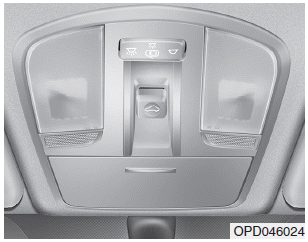Hyundai i-30: Convenient features of your vehicle / Steering wheel
Electric power steering (EPS)
The system assists you with steering the vehicle. If the engine is off or if the power steering system becomes inoperative, the vehicle may still be steered, but it will require increased steering effort.
Also, the steering effort becomes heavier as the vehicle’s speed increases and becomes lighter as the vehicle’s speed decreases for better control of the steering wheel.
Should you notice any change in the effort required to steer during normal vehicle operation, we recommend that the system be checked by a HYUNDAI authorised repairer.
NOTICE
- If the Electric Power Steering
System does not operate normally,
the warning light (
 ) will
illuminate or blink on the instrument
cluster. The steering wheel
may become difficult to control
or operate.Take your vehicle to a
HYUNDAI authorised repairer
and have the system checked as
soon as possible.
) will
illuminate or blink on the instrument
cluster. The steering wheel
may become difficult to control
or operate.Take your vehicle to a
HYUNDAI authorised repairer
and have the system checked as
soon as possible. - When abnormality is detected in the electric power steering system, to prevent a deadly accident, the steering assist function will stop. At this time, the warning light turns on or blinks on the cluster. The steering wheel may become difficult to control or operate. Have your vehicle checked immediately, after moving the vehicle to a safe zone.
Information
The following symptoms may occur during normal vehicle operation:
- The steering effort may be high immediately after placing the ignition switch button in the ON position. This happens as the system performs the EPS system diagnostics. When the diagnostics are completed, the steering wheel will return to its normal condition.
- A click noise may be heard from the EPS relay after the ignition switch is placed in the ON or LOCK/OFF position.
- Motor noise may be heard when the vehicle is at a stop or at a low driving speed.
- When you operate the steering wheel in low temperatures, abnormal noise may occur. If the temperature rises, the noise will disappear. This is a normal condition.
- When the vehicle is stationary, if you turn the steering wheel all the way to the left or right continuously, the steering wheel effort increases. This is not a system malfunction. As time passes, the steering wheel effort will return to its normal condition.
 Easy access function
Easy access function
The system will move the driver's
seat automatically as follows:
The shift lever is in P (Park)
• Without smart key system
- It will move the driver’s seat rearward
when the ignition key is
removed and the driver’s door is
opened...
 Tilt steering/Telescopic steering
Tilt steering/Telescopic steering
WARNING
Never adjust the steering wheel
whilst driving. You may lose
steering control and cause
severe personal injury, death or
accidents.
Information
After adjustment, sometimes the lockrelease
lever may not lock the steering
wheel...
Other information:
Hyundai i30 (PD) 2018-2025 Owner's Manual: Parking brake
Checking the parking brake Check the stroke of the parking brake by counting the number of “clicks’’ heard whilst fully applying it from the released position. Also, the parking brake alone should securely hold the vehicle on a fairly steep grade...
Hyundai i30 (PD) 2018-2025 Service Manual: Seat Belt Pretensioner (BPT)
Components and components location Components 1. Front Seat Belt Pretensioner. 2. Rear Seat Belt Pretensioner. Description and operation Description The Seat Belt Pretensioners (BPT) are installed inside Center Pillar (LH & RH)...
Categories
- Manuals Home
- 3rd Generation i30 Owners Manual
- 3rd Generation i30 Service Manual
- FCA sensor
- Front windscreen wiper service position
- Battery replacement
- New on site
- Most important about car
Panorama sunroof
If your vehicle is equipped with a sunroof, you can slide or tilt your sunroof with the sunroof control lever located on the overhead console.

The ignition switch must be in the ON position before you can open or close the sunroof.
The sunroof can be operated for approximately 30 seconds after the ignition key is removed or turned to the ACC or LOCK(or OFF) position. However, if the front door is opened, the sunroof cannot be operated even within 30 seconds.
